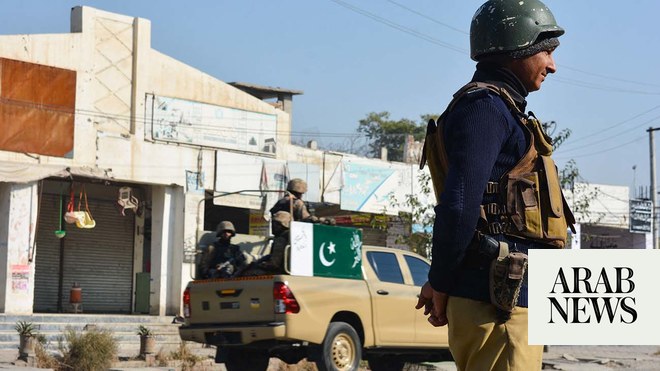Pakistan army says soldier killed in attack by “violent mob” dressed as Baloch rights activists
ISLAMABAD/QUETTA: The Pakistani army said one Pakistani soldier was killed and 16 others, including an officer, were wounded in an attack by “violent mob dressed as Baloch Raj Muchis”, a reference to ethnic rights protests in the southwestern province of Balochistan.
The Baloch Yaqjeti Committee (BYC), which defends the rights of Balochistan’s minority Baloch people, convened a “Baloch Raj Muchi,” or Balochistan National Rally, on Sunday in Balochistan’s port city of Gwadar to protest against alleged human rights violations, extrajudicial killings and enforced disappearances in Balochistan that human rights activists and victims’ families blame on Pakistani security forces, a charge the government and security agencies deny.
More than a dozen protesters travelling to Gwadar for Sunday’s rally were injured Saturday in clashes with security forces in Mastun district, officials and protesters said, as internet, mobile phone and broadband services were cut off in parts of Balochistan. “Security forces opened fire on our bus” as supporters left Mastun and headed for Gwadar, BYC member Gulzar Dost Baloch, who was leading the caravan in Quetta, said. One protester was killed in the clashes, according to the BYC.
But in a statement on Monday, the Pakistani military’s media wing said one Pakistani soldier was killed and 16 others were wounded in an “unprovoked attack by violent protesters.”
“Fake and malicious propaganda is being spread on social media using doctored photos and videos by propagandists to gain sympathy and support for the illegal violent march,” the military said.
“Acts of mob violence will not be tolerated. Those responsible will be brought to justice. All citizens are requested not to fall prey to propaganda but to maintain calm and peaceful attitude and cooperate with law enforcement agencies in maintaining public safety and order,” the army added, vowing to “thwart any attempt to disrupt peace and stability in Balochistan.”
Shortly after the military statement, BYC reported on X that Pakistani troops and paramilitary FC soldiers “launched yet another brutal and violent attack on a peaceful Balochistan national assembly sit-in in Gwadar” and “fired indiscriminately on peaceful protesters.” The news agency reported “multiple injuries and hundreds of arrests,” a claim that Arab News could not independently verify.
“Foreign Hands”
Pakistan’s Balochistan province, which borders Iran and Afghanistan, has been the scene of a small-scale separatist insurgency for the past two decades. They say they are fighting what they say is the federal government’s unfair exploitation of the province’s wealth. The Pakistani government denies the allegations and says it is working to develop the impoverished province. The government and military frequently accuse neighboring India, Afghanistan and Iran of stoking tensions in Balochistan and funding the insurgency, charges the country denies.
On Friday, authorities sealed all entry and exit points of the provincial capital Quetta and invoked Section 144 of the Criminal Procedure Code, which bans gatherings of more than four people, in parts of the province as BYC supporters tried to leave for the Gwadar protest led by activist Dr Mahlangu Baloch. Protesters then staged sit-ins on major highways in Quetta, Mastun, Kech and Turbat districts.
On Monday, the BYC ordered the provincial government to release all its detained members within 48 hours, warning that it would expand its protests, now in their third day, across Balochistan.
“If the government does not accept our demands, we will expand our protests to the whole of Balochistan,” Bebag Baloch, a BYC leader leading the protests in Mastun, told Arab News on Monday, adding that the group wanted all its arrested members to be released within 48 hours and for highways in the province to be opened to allow people to travel freely to protest sites.
Deputy Governor Quetta Saad bin Asad said on Monday that 22 people had been arrested for blocking a main road and disrupting traffic in the provincial capital.
Gwadar, on the Arabian Sea coast, is at the heart of the China-Pakistan Economic Corridor (CEPC), under which Beijing is pumping tens of billions of dollars into Pakistan’s massive transport, energy and infrastructure projects. But the work has been hit by Islamabad’s struggle to meet financial obligations and militant attacks on Chinese positions in Balochistan and other parts of Pakistan.
Balochistan’s Interior Minister Mehr Ziaullah Langobe has said the recent protests were a “conspiracy” against CPEC and claimed that a “foreign hand” was instigating the protests.
“Despite attacks by protesters, the people of Balochistan, police and security forces showed restraint in maintaining peace,” Langoub told Arab News.
“The government considers the protesters to be our brothers and sisters and we are ready to treat them with respect and engage with them,” Langove added. “But the state and [playing] The personal politics of these [rights] The issue is raising tensions.”
Meanwhile, life remained at a standstill for the third consecutive day in various cities of Balochistan with protesters still blocking the N-25 highway from Quetta to Karachi, the M-8 highway from Turbat to Hoshab and the coastal highway connecting Gwadar with Pakistan’s commercial capital Karachi.

